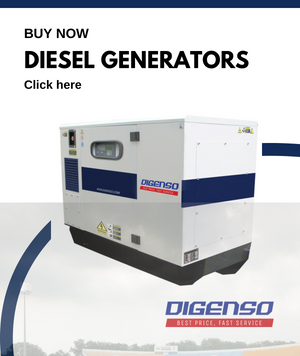- 98 Nguyen Cong Tru Nguyen Thai Binh Ward, District 1, Ho Chi Minh City
- [email protected]
- (+84) 0287 1069 898
Why Choose a Diesel Powered Generator?
Diesel engines are designed to use diesel fuel, obviously, but just what is different about a diesel gen-set, and why does that matter?
Petrol engines rely on an electric spark to ignite a moderately compressed fuel-air mixture inside the cylinder. This is easy to engineer and build, but it is not particularly efficient. Diesel engines rely on compression alone for ignition. The air (without fuel) is compressed to a much higher degree than in a petrol engine. The highest performance petrol engines compress to at 12:1 ratio at best. The lowest performing diesel engines work at 14:1 compression, and top of the line generators and gensets rely on compression ratios up to 25:1.
As the air is super-compressed, its temperature rises until the diesel fuel is injected. The fuel ignites spontaneously due to the heat and pressure – a much more efficient process, but one that relies on real precision engineering and manufacture. A petrol engine can work, though even less efficiently, with a leaky cylinder. A diesel engine won’t.
There are several basic types of diesel engines. They can use either a 2 cycle (or two stroke) or 4 cycle system. They can be either air or liquid cooled. Exactly what you need depends on just how many kVA or kWH you need, and what conditions the genset will be working in. For most purposes in Vietnam, we would suggest a water cooled 4 cycle diesel generator, as this is the quietest, most efficient and overall most effective configuration. Each type can be manufactured to supply standard, single-phase AC power or three-phase power, which is required for certain industrial purposes.
Why Is Diesel Better?
The core reasons are reliability and cost efficiency. For example:
-
Unlike the situation decades ago, today’s diesel generators are quieter, and less expensive to maintain than their petrol counterparts.
-
They are durable, and substantially more reliable.
-
The elimination of an electrical ignition system means there is much less to go wrong, and less downtime.
-
The cost per kW for a diesel generator is typically 30% to 50% less than with a petrol gen-set.
-
A diesel genset can run for 2 to 3 times as long as a comparable petrol genset between routine maintenance and servicing sessions. As much as 30,000 hours for an 1800 rpm diesel genset compared to 10,000 hours for petrol.
-
Petrol gensets have a higher operating temperature than diesel generators, which gives diesel units a substantially longer working life.
How Are Diesel Engines Used?
Diesel engines are used the world over to power plants and equipment, for electrical power generation and as vehicle engines. They are used in almost every industry and can be seen all around you, from the train or bus that takes you in to work to the plants and construction equipment that is busy building tomorrow’s Vietnam. They power almost every boat you see in the seas and rivers, and serve as back-up generators for hospitals, telecommunications companies and the thousands of other businesses we rely upon every day. They also serve as a very robust, convenient and efficient system of portable power generation.
Diesel Generators and Gensets
Diesel powered electrical generators(aka gen-sets (or generator sets) have innumerable industrial, commercial, military and even maritime applications. They are suitable for smaller, low kVA loads like individual homes, or can be scaled up to power entire factories, commercial complexes, cruise ships and even small towns. They excel both as primary power sources and as emergency or portable back-up power supplies. Small gensets, up to around 30kW, are more commonly used for home back-up power or for camping applications. Industrial diesel generators are made at al power levels, from as little as 30kW up to a few megawatts.
Source: https://dieselgeneratordirect.uk



